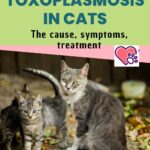
They have always called it “the disease of cats” and in fact 30% of felines are affected by it. Toxoplasmosis is a parasitic disease caused by the Toxoplasma gondii parasite. Toxoplasmosis infections usually cause no symptoms in adult humans. Sometimes a few weeks or a month of mild flu-like illness such as muscle aches, lymphadenopathy may be found. In a few cases, eye problems develop, but only those with weak immune systems can experience severe symptoms such as seizures and poor coordination.
That the disease could have consequences for humans was well known. But a new study has revealed that the problems caused by toxoplasmosis are very serious. For example, according to the researchers, it can alter more than 1,000 cancer-associated genes. It also alters communication between brain cells. This means that the risk of developing neurodegenerative diseases such as Alzheimer’s, Parkinson’s and epilepsy increases.
The results of the study
The study’s lead author, pointed out, “This study is a paradigm shift.” The research – from 1981 onwards monitored 246 infants with diseases related to Toxoplasma gondii. There is, the researchers say, a link between the parasite and its conditioning on nearly 1,200 human genes associated with cancer.
Then – as we said – the risk of developing neurodegenerative diseases is great. “We must at the same time translate aspects of this study into preventative treatments that include everything from drugs to diet to lifestyle to delay the onset and progression of the disease.” The invitation, of course, is not to create alarmism, but the care and cleaning of our domestic cats is important.
How does toxoplasmosis manifest itself?

In humans, toxoplasmosis is usually asymptomatic, but can cause low-grade fever and lymph node swelling. In immuno-compromised individuals (e.g. AIDS, Hodgkin’s disease, hemodialysis patients, patients under anticancer chemotherapy, etc.) disseminated toxoplasmosis can occur. Butchers, cooks, veterinarians (those who handle raw meat) are at greater risk. In the UK, the prevalence of anti- Toxoplasma antibodies ranges from 0.1% in one-year-olds to 45% in adults aged 50 and over. In France, where raw meat is often eaten, 80-90% of adults are HIV positive.
Most infections are asymptomatic, but 10% of cases result in miscarriages, stillbirths, or central nervous system damage. The incidence is highest when the infection occurs in the first trimester of pregnancy. Severely affected infants have retinochoroiditis and cerebral necrosis and may present with hepatosplenomegaly, liver failure, seizures, and hydrocephalus.






